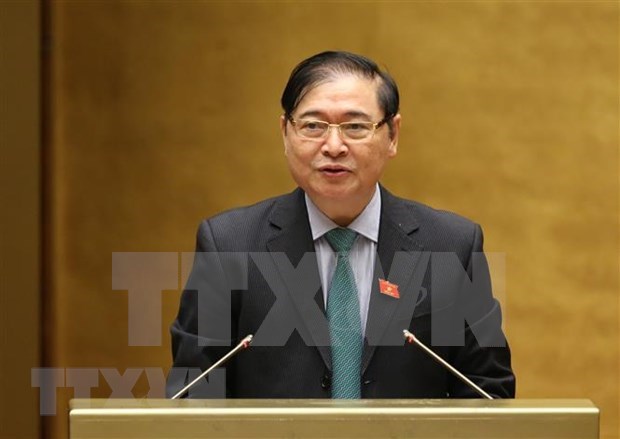the authority of environmental effect assessment, and the issuance of licence for waste release.
 |
|
Chairman of the NA Committee for Science, Technology and Environment Phan Xuan Dung (Photo: VNA) |
According to Chairman of the NA Committee for Science, Technology and Environment Phan Xuan Dung, in order to minimise the risk of environmental pollution from investment projects, the bill has two new contents on policies in sorting out the projects basing on their environmental impact, and the integration and promotion of green economic models, circulation economy, low-carbon economy in building and implementation of strategies, plans, programmes, and projects.
The bill also adjusts contents related to the responsibility in directing the response to environmental incidents of central and local agencies as well as the State management responsibility of ministries, sectors, localities, professional organisations as well as relevant individuals, he said.
Regarding the coherence of the bill with other relevant laws, many deputies pointed out that there are still overlapping and incoherence between the bill and other legal documents comprising contents related to environmental protection, including the Law on Biodiversity, Law on Water Resources, Law on Public Investment.
This may affect the efficiency of State management in environmental protection, they said, stressing the need to continue reviewing and adjusting the bill to avoid confrontation with other laws that were issued after 2014.
Regarding the issuance of environmental licences, many deputies agreed with the option of using a single environmental licence instead of seven, including the admission of wastewater to irrigation work.
Nguyen Thi Mai Hoa, a representative from the Mekong Delta province of Dong Thap, said that the simplification of the procedures will save time for enterprises. However, she stressed the need to design a tight procedure and strengthen inspection in the field.
Meanwhile, Thai Binh deputy Pham Van Tuan proposed that it is necessary to classify investment projects basing on environmental impact levels, taking it as a foundation to define the list of projects with risk of posing negative impact to the environment, thus ensuring the coherence of relevant laws.
Tuan pointed to the need to clarify the criteria for the classification, thus placing the projects to four groups of risks in four levels.
Over the regulations defining the projects subjected to environmental impact assessment to suit relevant laws, Dung said that the NA Standing Committee has prepared two options. In the first one, all projects must conduct the assessment, while in the other, only those with high risk of causing negative impact to the environmental are subjected to the assessment, he said./.
Legislators debate draft revised Law on Environmental Protection
NA deputies on October 24 said that there should be clearer and more detailed regulations on responsibilities and obligations of organisations, production and business establishments, and individuals in paying fees and taxes on environmental protection.
Giving their comments on the draft Law on Environmental Protection (revised) during the fifth day of the 14th National Assembly (NA)’s 10th sitting held virtually, lawmakers said the amount of money collected to invest in environmental protection is very little.
They attributed the situation to the absence of an appropriate mechanism to mobilise the participation and contribution of organisations and individuals to the protection of the environment, and regulations on the responsibility and obligations of fee payers for environmental protection.
The mechanism for infrastructure investment is mainly based on the voluntary spirit and support of businesses, and there are no specific regulations and legally binding mechanisms, said Vice Chairman of Hai Ha district People’s Committee Tran Viet Dung.
The NA should immediately issue guidance after the law takes effect so as to avoid overlapping tasks, other NA deputies said.
The law should also pay attention to the use of renewable energy sources, resolutely deal low-capacity hydropower plants thatw affect the forest environment, result in floods, and worsen climate change, they stressed, adding that projects at risk of causing harm to the environment should be carefully examined and verified./. VNA